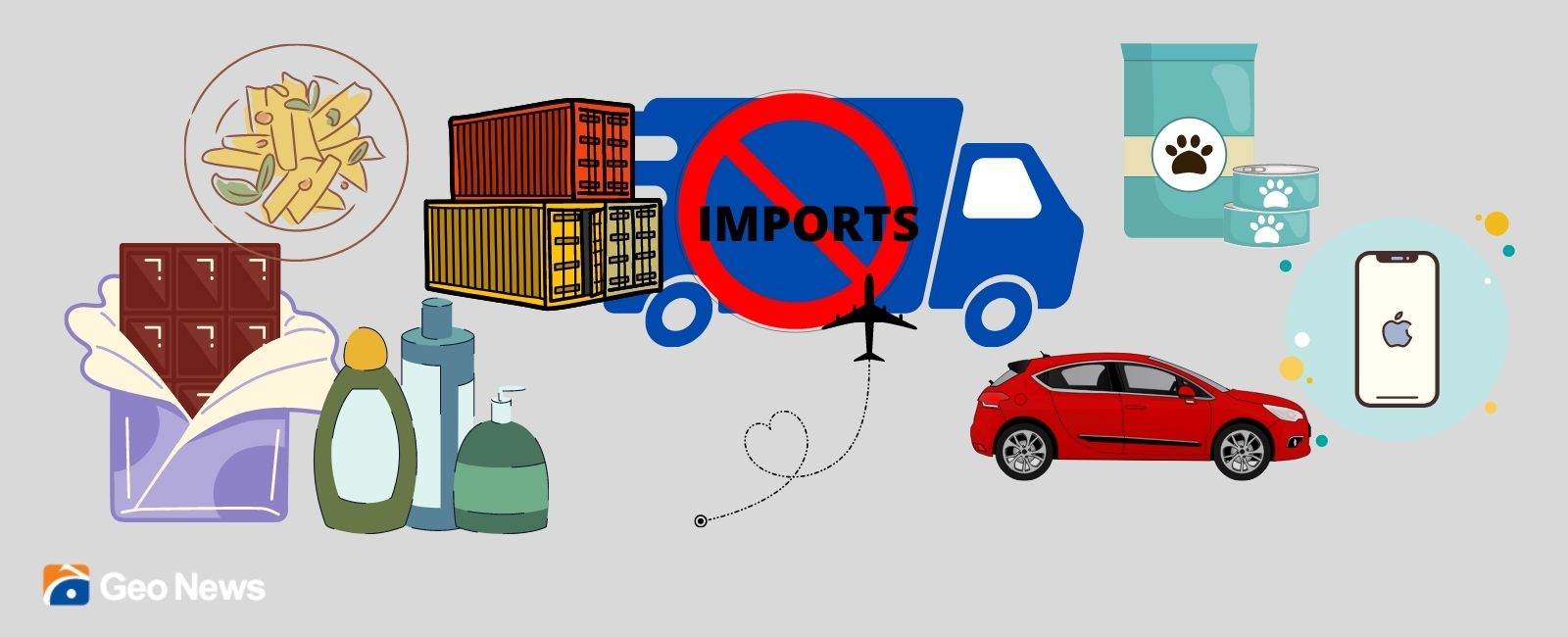'Absurd', 'too easy': Experts on government banning luxury imports
Slicing out luxury items from the import list also means a decline in the tax revenue collection of the FBR

Economic experts are skeptical of the government’s recent measures to ban the import of 38 non-essential luxury items, in a bid to contain Pakistan’s rising import bill and stabilise its national economy.
Last week, in a press conference, Information and Broadcasting Minister Marriyum Aurangzeb insisted that such "emergency" steps would save Pakistan $6 billion annually. But economic and financial experts are not convinced.
“Import curbs are an absurd response to Pakistan's economic challenges,” Shahrukh Wani, an economist at the International Growth Centre based at the University of Oxford, told Geo.tv, “Pakistan's fundamental problem is the lack of exports, not its imports.”
Recently, Pakistan’s liquid foreign currency reserves slid to just above $10 billion, while the Pakistani rupee weakened to over 200 against the US dollar. To add to its troubles, the country’s imports jumped to $65.5 billion in the first 10 months (July-April) of the ongoing fiscal year 2021-22.
The imports are further projected to touch between $75 billion to $78 billion by the end of June.
Read more: Which items has the government banned?
With only $16.16 billion reserves left, as of May 13, Pakistan has barely enough to cover imports for the next two months.
During such an economic emergency, slashing non-essential items from the import bill is being seen as more of a "populist" measure rather than a "substantial" one.
“These curbs won't fix Pakistan's trade deficit,” explains Wani, “As most of the products under the import ban make up a very small part of Pakistan's imports. The most significant items on the [list of] restrictions are automobiles and mobile phones, but even with them, this won't make a substantial difference.”
The 38 items, now banned, make up only 4 to 5% of Pakistan’s total import bill, according to an estimate by brokerage houses, based on the data of the financial year 2021.
Whereas, a larger chunk of the country’s imports are petroleum, machinery, edible oils, and chemicals, all of which are necessary for running the economy.
Read more: PM Shehbaz 'requests' business community to present solutions to Pakistan's economic woes
There is another problem. Slicing out luxury items from the import list also means a decline in the tax revenue collection of the Federal Board of Revenue (FBR).
In the first ten months of the ongoing fiscal year 2021-22, over 50% of FBR’s revenue was collected at the import stage. If tax collection shrinks then Pakistan will not be able to meet its upwardly revised collection target of Rs6.1 trillion.
“I also expect that the smuggling of these [banned] products will increase significantly over the coming few months,” warned Wani.
However, JS Global, the Lahore-based broking and investment banking firm, expect positive results from the import slash. According to a report by the firm, released last week, a ban on the over three dozen items will help save approximately $100 million per month, an impact that will become more clear over time.
A report released by the Insight Securities, also last week, called the steps “directionally right” but added that the government had chosen the “easiest way” to tackle pressure on foreign exchange reserves.
This measure is a “temporary patch and much-needed reforms are required”, suggested the company in its report, explaining that the ruling party should instead make tough decisions, such as reversing the petroleum and electricity subsidies to bring the International Monetary Fund (IMF) on board.
Read more: How a turbo-charged dollar is zooming past several Asian currencies
As per estimates, by ending the subsidies on fuel, announced by the previous government, the new finance minister can win a $1 billion tranche from the IMF.
However, it remains to be seen how the Fund will view these band-aid measures by Prime Minister Shehbaz Sharif, as it was previously agreed with Pakistan that during the period of the IMF programme Pakistan will not impose or intensify restrictions on the making of payments and transfers for international transactions or modify multiple currency practices, or impose import restrictions for balance of payments purposes.




